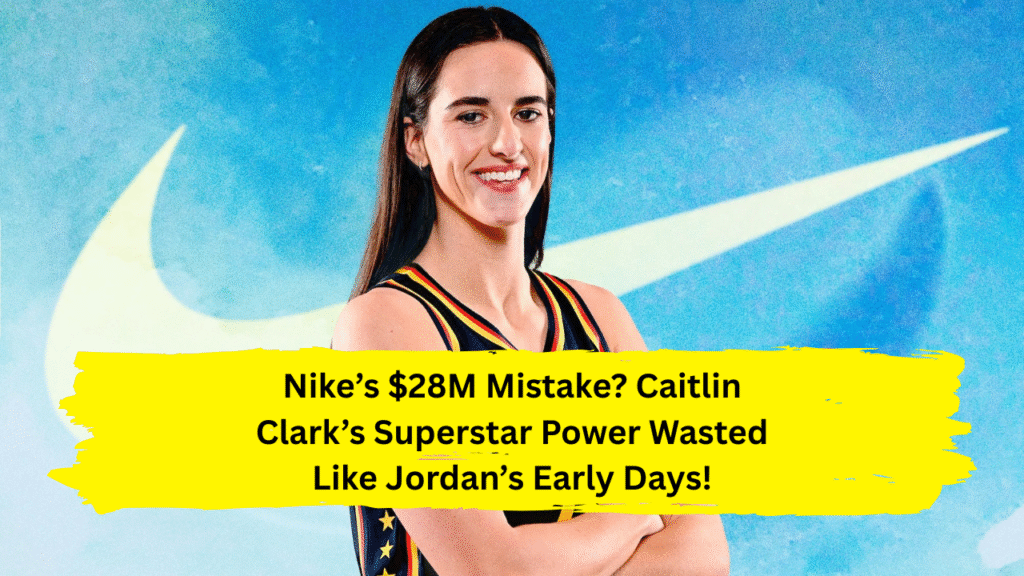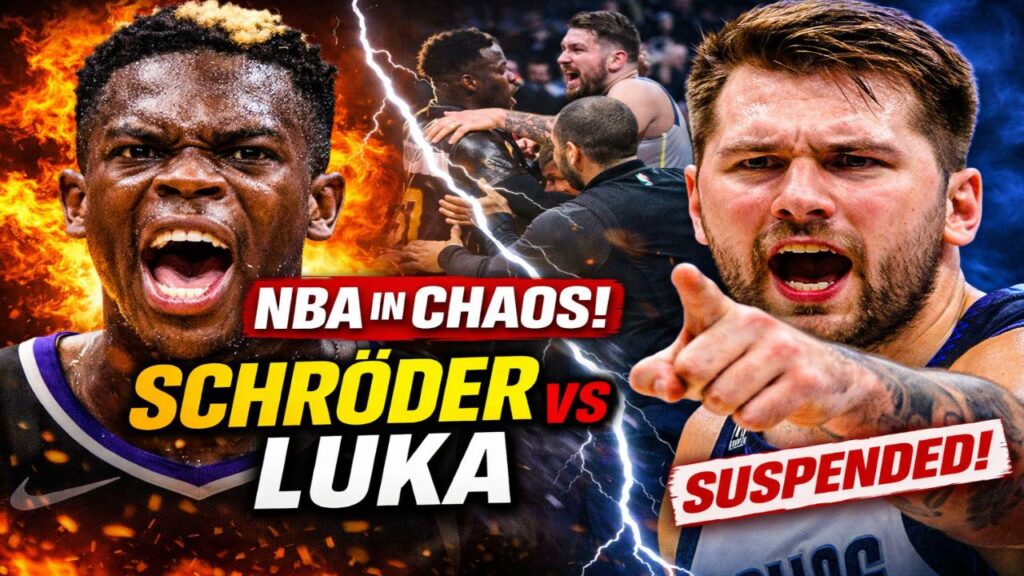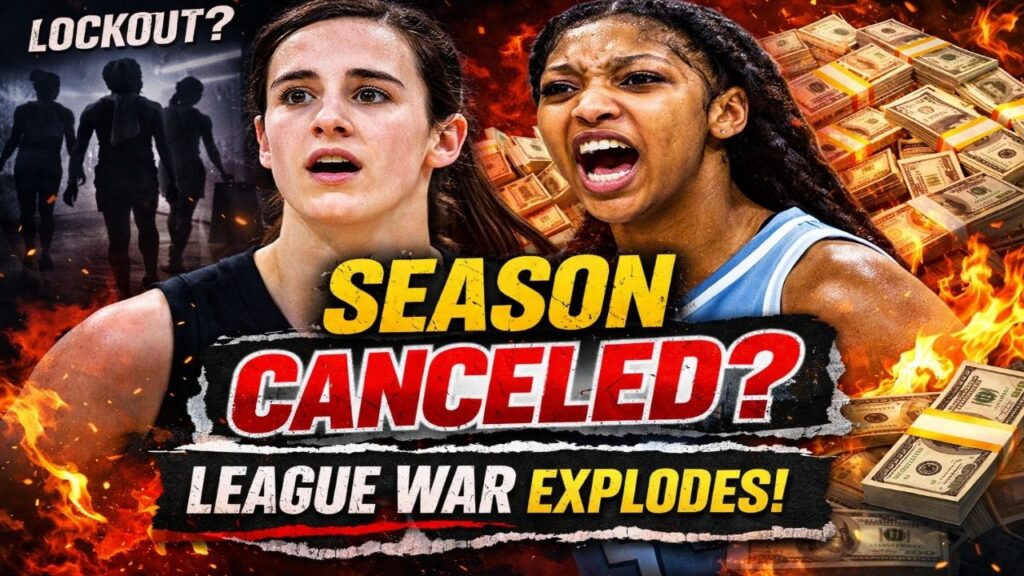You hear that? That’s the sound of cash registers not ringing. Jerseys vanishing faster than Taylor Swift tickets. Arenas overflowing like a tipped-over beer cup. TV ratings shattering NBA records. All fueled by one name: Caitlin Clark. She’s not just a basketball player—she’s a full-blown American phenomenon rewriting the rules of sports marketing. So why, 14 months after signing her to a historic $28 million deal, is Nike treating her like a forgotten benchwarmer in their own marketing playbook? Strap in. This isn’t just a branding blunder—it’s corporate self-sabotage playing out on the world’s biggest stage.
The Unmatched Star Power Gathering Dust in Beaverton
Let’s rip off the band-aid: Caitlin Clark moves cultural needles like no athlete since LeBron or Jordan. Her Iowa Elite Eight showdown against LSU? 16 million viewers—dwarfing the 2023 NBA Finals. Her WNBA draft obliterated records with 2.45 million eyeballs glued to screens. Her Indiana Fever jersey? Sold out in under 30 minutes. Yet since Nike won a vicious bidding war against Adidas and Under Armour (with Steph Curry himself lobbying Clark), her only “signature” item is… a billboard.
Compare this to Nike royalty. LeBron James debuted his first signature shoe during his rookie debut. Kevin Durant had his line before playing an NBA minute. Clark? She’s been handed “Player Exclusive” Kobes—repainted hand-me-downs from a legend who passed away four years ago. As former Nike marketing director Jordan Rogers raged on TikTok: “You have the unicorn, the chosen one… and you are just sitting around”. It’s like buying a gold mine and using it to store rusty shovels.
The Slow-Play Strategy Backfires—Spectacularly
While Nike hesitates, rivals are sprinting past them. Rookie rival Angel Reese announced her Reebok signature shoe weeks ago, hitting shelves June 2025. Clark’s partners like Gatorade built entire campaigns around her authenticity and Midwest grit—their “Whatever It Takes” spot felt like a warm hug to every underdog dreamer. State Farm leveraged her everywoman appeal. Even Wilson crafted a custom “Caitlin Clark” basketball line.
Nike’s silence? Deafening. Especially jarring when you consider their 64% stock plunge since 2021, the ousting of CEO John Donahoe, and leaked memos admitting “we lost our edge”. One sports economist nailed it: “Struggling Swoosh refused to lean down and grab free money on the ground.”
The Three Ugly Truths Behind Nike’s Freeze
Why ignore a golden goose? Let’s dissect the theories:
1. Dancing Through a Political Minefield
Clark’s meteoric rise collided with toxic debates about race, privilege, and media bias in women’s sports. Rogers suspects Nike is “wringing your hands and afraid to enter into this politically divisive conversation.” When Clark’s deal dropped, viral outrage erupted: “Why does a white rookie get $28M before A’ja Wilson gets a signature shoe?” (Never mind that Wilson still doesn’t have one either). Nike’s silence screams they’d rather avoid heat than harness history.
2. Internal Politics Eating Its Young
Nike might be appeasing established stars like A’ja Wilson—a two-time MVP who publicly craved marketing love. “A’ja has to come first,” an insider told The Athletic, despite Clark’s superior commercial metrics. But since when does greatness require permission? Nike built its empire celebrating all icons—Jordan and Barkley, LeBron and Kobe. This zero-sum thinking betrays their DNA.
3. Bureaucracy Strangling Brilliance
With leadership chaos (three CEOs in five years) and a scramble to fix broken retailer relationships, bold creativity flatlined. Designing a signature shoe typically takes 18-24 months—but Clark’s team expected “LeBron 2003” treatment: fast-tracked, all-hands urgency. Instead, she vanished into PowerPoint purgatory.
The Gender Design Dilemma Nobody’s Discussing
Even if Nike greenlights Clark’s shoe tomorrow, a critical battle awaits: Should it be unisex or women-specific? Industry legend Matt Powell warns: “A woman’s foot is more triangular with a higher arch; a man’s is rectangular. A sized-down men’s shoe is a blister factory.” For Clark—a symbol of women’s sports evolution—this isn’t just commerce. It’s a statement. Nike could redefine performance gear for female athletes… or slap a pink stripe on Kyrie’s leftovers and call it “empowerment.”
Fan Fury Reaches a Tipping Point
Fans aren’t just disappointed—they feel gaslit. After Rogers’ viral exposé, social media detonated:
“I’m tired of being lied to by Nike.”
“They refuse to promote both CC & A’Ja simultaneously. It’s embarrassing.”
“Just Do It? More like Just Sit On It.”
This mirrors Nike’s broader credibility crisis. As ex-Y&R Advertising Chair Peter Georgescu argues, Nike’s decline stems from alienating core audiences—prioritizing ESG metrics and cost-cutting over the rebel storytelling that built the brand. When you ghost the very disruptors who made you cool, karma comes knocking.
The Path to Redemption (If Nike Finds Its Spine)
New CEO Elliott Hill faces a legacy-defining choice:
- Fast-Track a TRUE Signature Line—not PE Kobes. Collaborate with Clark on anatomically intelligent design. Let her test traction patterns and ankle support for guards who play like tornadoes.
- Launch Cross-Platform Storytelling that captures her essence—the Iowa farm girl who rewrote record books, the trash-talking assassin who backs it up.
- Embrace Her Full Audience: 12-year-old girls shooting from the logo, dads driving 5 hours for games, casual fans who adore her unapologetic swagger.
When asked about the delay, Clark shrugged: “I don’t make those decisions.” But Nike’s window is closing. If they can’t monetize a once-in-a-generation star, shareholders will revolt—and Reebok, Puma, and New Balance are circling with blank checks.
The Final Buzzer
Caitlin Clark is a litmus test for Nike’s soul. In an era where culture drives commerce, their caution isn’t just baffling—it’s a surrender note. The lesson echoes from Beaverton to every boardroom: Fortune favors the bold. And right now, Nike looks terrified of its own fortune.
The ball’s in your court, Swoosh. Just Do It.
Key Takeaways:
- Nike’s $28M bet on Caitlin Clark remains shockingly untapped despite her record-breaking cultural impact, jersey sales, and TV ratings.
- Fear of racial politics, internal hierarchies, and bureaucratic gridlock have paralyzed signature product launches, costing Nike mindshare and revenue.
- Rivals like Reebok (Angel Reese) and partners like Gatorade/State Farm are outmaneuvering Nike with faster, culturally authentic campaigns.
- Fans view Nike’s silence as betrayal, exacerbating existing brand trust issues rooted in profit-over-passion decisions.
- Redemption requires radical action: true signature footwear designed for female anatomy, multi-platform storytelling, and leveraging Clark’s cross-generational appeal before the moment fades.


